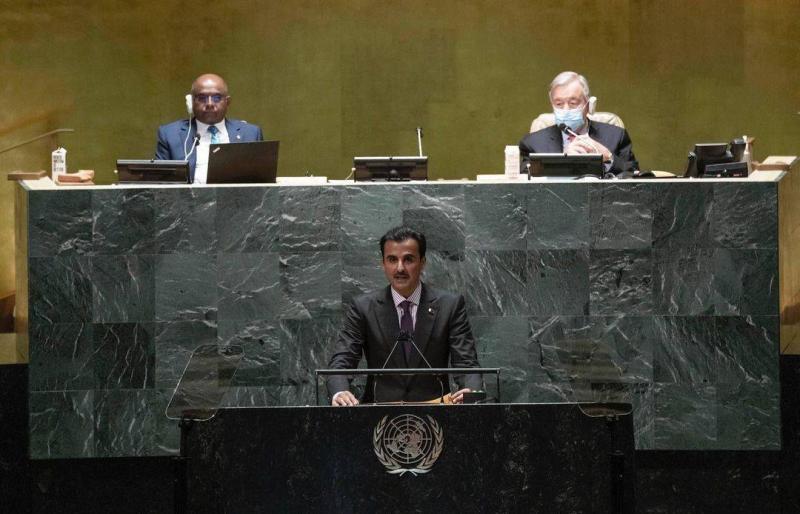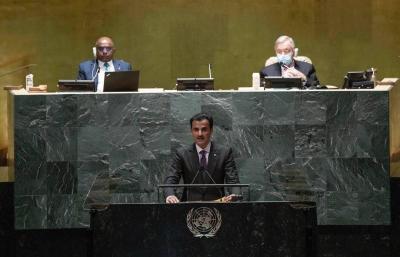The Emir of Qatar, Sheikh Tamim bin Hamad Al Thani, expressed today, Tuesday, his confidence in "cementing the reconciliation achieved among brothers in accordance with the Al-Ula declaration." He elaborated during his speech at the 76th session of the United Nations General Assembly, stating, "The Al-Ula declaration issued by the leaders of the Gulf Cooperation Council in January reflects the principle of resolving disputes through dialogue based on mutual interests and respect, and we are confident in solidifying this reconciliation among brothers."
The Emir noted that "the subject of disputes places significant burdens on the United Nations since its establishment, and unfortunately, the Middle East region constitutes a significant source of these burdens. Therefore, Qatar considers contributing to peaceful conflict resolution among its priorities." He added, "We have always sought to establish an environment of peace, stability, and cooperation in the region; for instance, regarding the Gulf, our immediate environment, we have repeatedly emphasized the importance of the Gulf Cooperation Council and our commitment to resolving any disputes through constructive dialogue."
The Emir of Qatar affirmed that "his country is committed to the unity of Yemen and the integrity of its territories, and the only way forward is through negotiations among the Yemeni parties." Sheikh Tamim bin Hamad Al Thani also saw "the positive developments witnessed in Libya over the past year as a cause for cautious optimism," calling on all Libyan parties to maintain these gains, ensure the full implementation of agreements reached, and work towards comprehensive reconciliation.
He emphasized that "rational dialogue based on mutual respect is the solution to disputes and differences in viewpoints with Iran, and this applies to the issue of returning to the nuclear agreement with Iran. I do not believe anyone has an alternative to this approach, including those who oppose returning to the agreement."
During his speech at the 76th session of the United Nations General Assembly, the Emir underscored that "the Syrian crisis has turned into a humanitarian disaster due to the war waged by the regime against its people. The Syrian issue should not be neglected, and the international community must not turn its back on the suffering of the Syrian people, as seen recently during the bombardment of Dara’a and elsewhere. There may come a day when we remember this neglect of human suffering with great regret."
He added, "The international community must double efforts to end this crisis through a peaceful solution in accordance with the Geneva I Declaration and implement Security Council Resolution 2254 in all its aspects while preserving the territorial and national unity of Syria, its sovereignty, and independence."
Regarding the current crisis in Afghanistan, the Emir mentioned that "the decision to withdraw U.S. forces from Afghanistan marked a significant turning point for this country." He noted that "his country has spared no effort in evacuating thousands from Afghanistan, which is a humanitarian duty." He said, "Qatar has not spared any effort in helping evacuate thousands of individuals and families from various nationalities in recent weeks; this was our humanitarian duty. However, the more important point I wish to highlight is that we were confident that war is not a solution."
He reiterated that "the issue in Afghanistan is not one of victory or defeat but rather an issue of failing to impose a political system from the outside, regardless of the intentions, efforts made, and money invested; this experience collapsed in Afghanistan after 20 years." The Emir confirmed that he would continue to coordinate with the country's international partners to do everything possible to ensure the preservation of tangible gains achieved along the Doha path, emphasizing that it is essential for parties to uphold their commitments.
The Emir of Qatar, Tamim bin Hamad Al Thani, urged the international community to achieve a comprehensive and just peaceful settlement for the Palestinian cause. He pointed out that "this year witnessed numerous Israeli violations in occupied East Jerusalem and repeated assaults on Islamic and Christian sanctities, particularly the Al-Aqsa Mosque during Ramadan, as well as the seizure of Palestinian homes under policies of Judaization and settlement."
He continued, "As a result of this ongoing procrastination, some here and there appear to believe that the Palestinian issue can be marginalized on the international agenda or that a deeply rooted national issue can be circumvented by proposing ideas such as improving the living conditions of the occupied population instead of removing the occupation."
In his speech, he also underscored the necessity for equitable distribution of COVID-19 vaccines and ensuring their access to countries in the Global South, as well as the need to coordinate efforts to combat another pandemic: the pandemic of misinformation, conspiracy theories, and doubts about vaccine efficacy.
The Emir of Qatar affirmed that "our meeting today under the theme of restoring hope and our physical gathering—not virtual—sends an important signal about returning to the normal course of life, without abandoning precautionary measures, of course, after a difficult period the world has lived through and continues to endure due to the COVID-19 pandemic."




